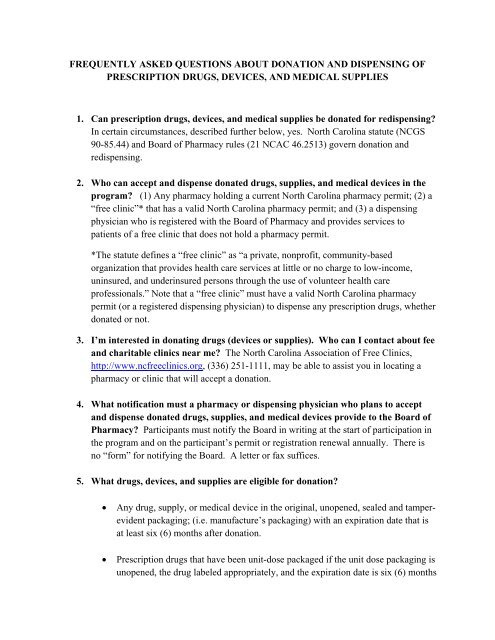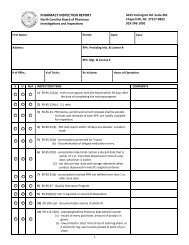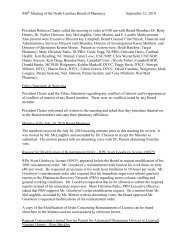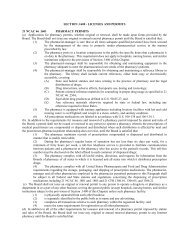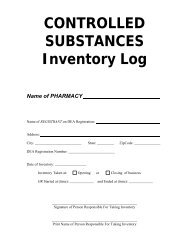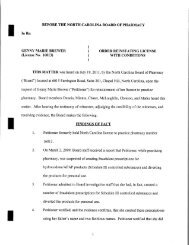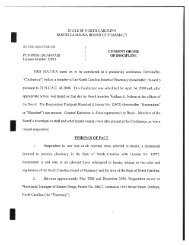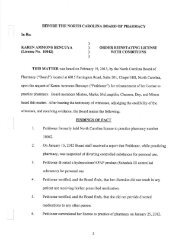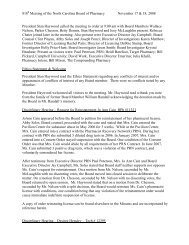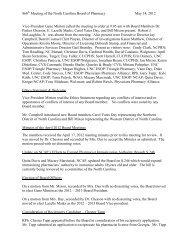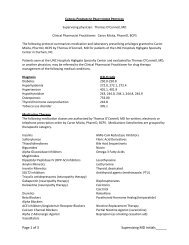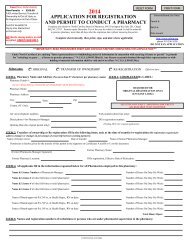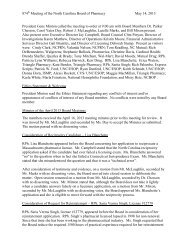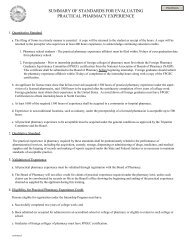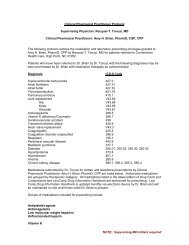TO READ FAQs ABOUT DONATION AND DISPENSING OF ...
TO READ FAQs ABOUT DONATION AND DISPENSING OF ...
TO READ FAQs ABOUT DONATION AND DISPENSING OF ...
You also want an ePaper? Increase the reach of your titles
YUMPU automatically turns print PDFs into web optimized ePapers that Google loves.
FREQUENTLY ASKED QUESTIONS <strong>ABOUT</strong> <strong>DONATION</strong> <strong>AND</strong> <strong>DISPENSING</strong> <strong>OF</strong>PRESCRIPTION DRUGS, DEVICES, <strong>AND</strong> MEDICAL SUPPLIES1. Can prescription drugs, devices, and medical supplies be donated for redispensing?In certain circumstances, described further below, yes. North Carolina statute (NCGS90-85.44) and Board of Pharmacy rules (21 NCAC 46.2513) govern donation andredispensing.2. Who can accept and dispense donated drugs, supplies, and medical devices in theprogram? (1) Any pharmacy holding a current North Carolina pharmacy permit; (2) a“free clinic”* that has a valid North Carolina pharmacy permit; and (3) a dispensingphysician who is registered with the Board of Pharmacy and provides services topatients of a free clinic that does not hold a pharmacy permit.*The statute defines a “free clinic” as “a private, nonprofit, community-basedorganization that provides health care services at little or no charge to low-income,uninsured, and underinsured persons through the use of volunteer health careprofessionals.” Note that a “free clinic” must have a valid North Carolina pharmacypermit (or a registered dispensing physician) to dispense any prescription drugs, whetherdonated or not.3. I’m interested in donating drugs (devices or supplies). Who can I contact about feeand charitable clinics near me? The North Carolina Association of Free Clinics,http://www.ncfreeclinics.org, (336) 251-1111, may be able to assist you in locating apharmacy or clinic that will accept a donation.4. What notification must a pharmacy or dispensing physician who plans to acceptand dispense donated drugs, supplies, and medical devices provide to the Board ofPharmacy? Participants must notify the Board in writing at the start of participation inthe program and on the participant’s permit or registration renewal annually. There isno “form” for notifying the Board. A letter or fax suffices.5. What drugs, devices, and supplies are eligible for donation?Any drug, supply, or medical device in the original, unopened, sealed and tamperevidentpackaging; (i.e. manufacture’s packaging) with an expiration date that isat least six (6) months after donation.Prescription drugs that have been unit-dose packaged if the unit dose packaging isunopened, the drug labeled appropriately, and the expiration date is six (6) months
from the date of donation.6. What drugs, devices, and supplies are not eligible for donation? Any drug, device, or supply that does not meet the criteria listed in Question 4above is not eligible for donation. This means, for instance, that prescriptiondrugs that have been dispensed to patients in amber vials (or similar) are noteligible for donation.Controlled substancesAny prescription drug or medical device that has restricted distribution by theFDA. Examples include thalidomide, isotretinoin, Zyprexa Relprevv (olanzapine)extended release injection, rosiglitazone maleate. More complete informationabout drugs subject to FDA-mandated restricted distribution systems may befound here:http://www.fda.gov/Drugs/DrugSafety/PostmarketDrugSafetyInformationforPatientsandProviders/ucm111350.htm#Additional_REMS_informationCompounded drugs or parenteral admixturesBiologicals and any drug requiring refrigeration, unless such drugs are donatedby the manufacturer, a prescription drug wholesaler, or a pharmacy that has storedthe drug/biological according to manufacturer’s labeling. A biologic or drugrequiring refrigeration may not be donated even by the manufacturer, awholesaler, or a pharmacy if the drug has been previously dispensed to a patient.7. Who can donate drugs, supplies, and medical devices? A patient or the patient’s family member. Note: As discussed in Question 3above, any donated drug, device, or supply must be in the manufacturer’s original,sealed packaging or in unopened unit dose packaging. This, as a practical matter,great reduces the amount of prescription drugs eligible for donation from patientsor patient family members .A manufacturer, wholesaler or supplier of drugs, supplies or medical devicesA pharmacy, free clinic, hospital or hospice care program.
8. Which patients are eligible to receive donated drugs, supplies and medical devices?Donated drugs, supplies, and devices may be dispensed to North Carolina residents.Dispensing pharmacies and clinics must establish written patient eligibility policies that givepriority to patients who are “uninsured or underinsured.” If “uninsured or underinsured”patients are not available to receive dispensing, the pharmacy or clinic may dispense toother patients in conformance with the written eligibility policy.9. Can a pharmacy or free clinic charge a handling fee when dispensing donateddrugs, supplies, and medical devices? Yes. But the fee may not exceed the co-paymentestablished by North Carolina Medicaid and required of a North Carolina Medicaidbeneficiary who receives the same prescription drug in the same quantity. Neither the statutenor Board rule requires that a handling fee be charged.Note: Resale of donated drugs, supplies, and devices is expressly prohibited.10. What records are required for a participating pharmacy or dispensing physicianthat dispenses donated drugs, supplies, or medical devices?The pharmacy or dispensing physician who dispenses donated drugs, supplies, or devicesmust maintain a written or electronic inventory of each donated drug, supply and medicaldevice that includes: Name of the donated drug, supply or medical device Strength Dosage form Number of units donated Manufacturer’s lot number Expiration date Name, address and phone number of the donor that provided each drug,supply or medical device.When a donated drug, supply, or device is dispensed to a patient: The fact that a donated items was dispensed must be recorded on the faceof the written prescription or in the electronic record of the prescription. Patient-specific written or electronic documentation of any dispensing of adonated non-prescription drug, supply or medical device should also be
maintained.Note: These recordkeeping requirements apply to the dispenser of donated items. Thedonor is not required to create and maintain such records for purposes of the donationstatute and rules.11. Must donated drugs, supplies and medical devices be physically separated fromnon-donated inventory? Yes. And the inventory area holding donated drugs, supplies, anddevices must be clearly identified.12. If a pharmacy or dispensing physician ceases participation in a donation programwhat procedure should be followed? The participant should notify the board in writingwithin 30 days and submit a written report that includes details on the final disposition of alldonated drugs, supplies and medical devices.13. Does the donation statute provide any protections for donors of drugs, devices, andsupplies or pharmacies/clinics that dispense donated items? Yes. The statute providesimmunity from civil liability relating to the donation or dispensing of drugs, devices andsupplies as follows:Pharmaceutical Manufacturer: Unless a pharmaceutical manufacturer exercises bad faith,the manufacturer is not subject to criminal or civil liability for injury, death, or loss to aperson or property for matters related to the donation, acceptance, or dispensing of a drug ormedical device manufactured by the manufacturer that is donated by any person under theProgram, including liability for failure to transfer or communicate product or consumerinformation or the expiration date of the donated drug or medical device.Other Donors, Pharmacies, Pharmacists, Clinics, Physicians, Practitioner that Administers aDonated Drug, Device or Supply: Each are immune from civil liability for an act oromission that causes injury to or the death of an individual to whom the drug, supplies, ormedical device is dispensed, and no disciplinary action may be taken against a pharmacist orpractitioner as long as the drug, supplies, or medical device is donated in accordance withthe statute and rules governing such donation and dispensing.5/18/12


